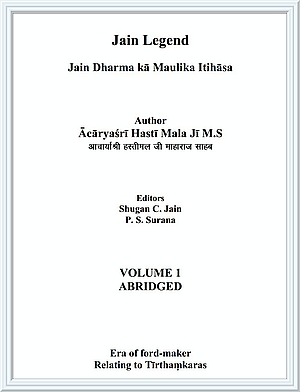In the present declining happiness cycle in the Bharata region in Jambūdvīpa king Sagara was the second cakravartī. Some years after Lord Ajitanātha's establishment of the tīrthas a heavenly cakra appeared in king Sagara's armory. On this great occasion king Sagara instructed a festive celebration across his entire kingdom for eight days. This way, including the heavenly cakra jewel, a total of fourteen jewels appeared at the king's place.
Sagara gained victory over six divisions of Bharata and established his sovereign rule over the entire Bharata for 32,000 years. He had nine treasures. 32,000 crown kings were always ready to serve him. King Sagara's palace had 64,000 queens and 60,000 sons, including Sahasrāṃśu, Sahasrākṣa, Jahnu, Sahasrabāhu, etc. According to Ācārya Sīlāṃka's 54 Mahāpurisacariyaṃ and Ācārya Hemacandra's Triṣaṣṭi śalākā Puruṣa caritra, 60,000 sons including Sahasrāṃśu started a campaign for Bharata with the jewels such as Army General Jewel, Staff jewel, etc. with a huge army. After traveling across many places they reached the mountain Aṣṭāpada. There they saw Jina temples and in order to preserve those temples they thought of digging a pit all around the mountain and dug up pits as low as the palaces of the Bhavanapatis. With the help of the staff-jewel, Jahnu dug up the banks of river Gaṃgā and filled the pits with water from there. The water reached the homes of the Bhavanapatis, which aroused the wrath of Nāgakumāras who through the poison in their eyes burnt the 60,000 sons into ashes.
Jain śāstras do not mention the events related to this story or the Jina temples constructed by Bharata. It is possible that the Jain ācāryas presented such a tale inspired by one narrated in the Purāṇas about Indra tying up the sacrificial horse of the king Sagara - desirous of conducting hundred aśvamegha sacrifices - in the netherworld near sage Kapila, and Sagara's sons reaching there and creating a ruckus. Whatever it may be, but king Sagara's narrative / story is one of disenchantment and gives a lesson. The story goes on as follows:
Hearing of the death of all his sons at the same time produced a heartrending pain in Sagara. He could not imagine that his state could be so pathetic, helpless and hopeless in spite of being the suzerain Lord of the six regions of Bharata, the Lord of fourteen heavenly jewels, nine treasures, and a cakravartī emperor. He began to wail in anger as to what could be a better example of the meaninglessness of worldly riches and accomplishments and strength than this. What can be a greater mockery than this that a Lord of six divisions, a cakravartī emperor could not even protect his own family? This entire world is a dangerous web of illusion and a whodunit, unreal and false. It is futile to get stuck in its illusion. I wasted in vain my human life behind this meaningless wealth. Thus, what has to happen and has happened. Now I shall make my human life worthwhile.
This way, disenchanted by worldly affairs cakravartī Sagara anointed his grandson Bhagīratha on the throne and took initiation into mendicancy under Tīrthaṃkara Lord Ajitanātha, observed pure austerities and intense meditation. He destroyed the four obscuring karmas in the flame of his austerities and restraint and obtained pure knowledge and in the end, destroying the non-obscuring karmas also, obtained the immortal happy state of nirvāṇa.
 Acharya Hasti Mala
Acharya Hasti Mala
